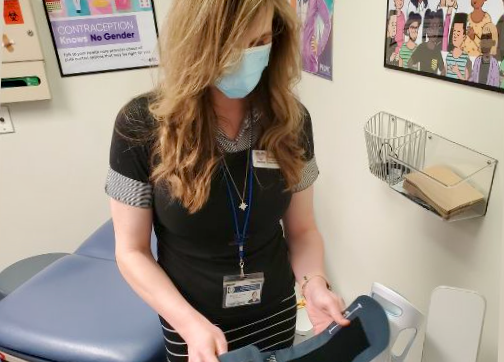As states around the Midwest consider and pass policies restricting access to gender-affirming care and the rights of transgender individuals, many say Illinois is moving towards becoming a haven for gender-affirming healthcare and trans rights in general.
Some trans people say it already is one.
Michelle Hanlon, a nurse at the Champaign-Urbana Public Health District and trans woman, said she’s had to turn down work opportunities because not every state has the same protections for the trans community as Illinois.
“I’d actually been offered a couple of contracts travel nursing, but the agency I was going to contract through wasn’t based out of Illinois, so they weren’t required to provide gender-affirming care for their insurance,” Hanlon said. “So that was a big factor in ‘Oh, I guess I really can’t do travel nursing.’ And that was before a lot of this wave of bills had come through.”
According to the Trans Legislation Tracker, nearly 20 bills targeting the rights of transgender people were introduced in 2019.
Fast forward to this year, and nearly 500 bills have been introduced or approved in statehouses across America and in Congress in 2023 alone.
Hanlon said she feels secure that she’ll keep her access to care in Illinois, but that’s not the case in neighboring Iowa, Indiana and Kentucky.
All three states have passed bans on gender-affirming healthcare for minors this year.
“It’s often couched under the rubric of protecting children, and by doing that, essentially legislators are taking away the rights of parents to decide what healthcare their child needs and what their child doesn’t need,” ACLU Illinois Communications Director Ed Yohnka said.
He called it an “effort to deny fundamental healthcare” and said it should be up to medical professionals to determine what care is suitable.
“Having the government say, ‘You aren’t who you think you are’ — that’s not the role of government,” Yohnka said.
Several medical organizations, like the American Medical Association and the American Academy of Pediatrics, support age-appropriate gender-affirming care.
Alex Eaton, a trans student at Parkland College, said restrictions like the ones in neighboring states would have stopped the hormone therapy he began at 17 years old.
His parents and his doctors approached his transition with lots of caution, Eaton said.
“I was like, ‘This was something I want to do,’ and they were like, ‘Let’s talk to a doctor,’” he said. “They weren’t going to help me rush into it, even if I wanted to — not that I could have because there are procedures and stuff.”
When it comes to minors who want to pursue gender-affirming medical care, Dr. Diane Alexander, a psychologist in Champaign and trans woman, said she’s very careful because she wants to help people get the care they need but also ensure that adolescents don’t make choices they might later regret.
“I think the process should be there, but I think it should be prohibitive to some extent for minors,” Alexander said.
On April 13, the Missouri attorney general enacted emergency regulations that prevent medical providers from providing gender-affirming care to anyone unless they meet extremely stringent state requirements.
Even though the restrictions have been temporarily halted as of May 1, Micah Ballard, the community center manager for Metro Trans Umbrella Group in St. Louis, said these restrictions have many members of the trans community in the area thinking about relocating.
“I’ve had several community members talk about either considering moving to Illinois or another state that is affirming or are actively making plans to move out of state and move to Illinois,” Ballard said.
Dr. Alexander said she already sees patients that have come to Illinois for its more accepting environment.
But even though Illinois has enshrined legal access to care, there still aren’t enough providers and resources available, she said.
“Even just with the population that occurs in our state, we’re behind the curve from where I would like us to be,” Alexander said. “So then you add an influx — the system could be overwhelmed.”
Earlier this year, Illinois Governor J.B. Pritzker signed a law guaranteeing that in-state providers can’t lose their licenses for providing care that’s legal in the state of Illinois, even if that care is illegal elsewhere.
This would protect providers that give gender-affirming care to minors in Illinois from laws like one in Kentucky, which say any medical providers who violate the state’s ban could have their licenses revoked.
State Representative Kelly Cassidy, who sponsored that legislation, said that she hopes the trans community will keep feeling safe to seek care here.
Cassidy leads a working group focused on gender-affirming care and reproductive health care, and she said they plan to keep finding ways to make Illinois a more affirming space for the trans community.
“We are keeping it legal. We are maintaining access. We are going to protect everyone we can,” Cassidy said. “Don’t be disheartened by what’s happening around us. Illinois is going to remain a haven.”

